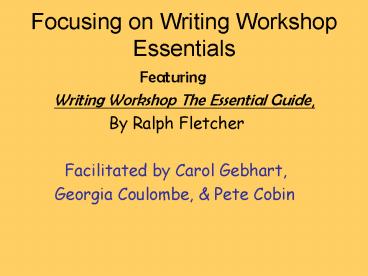Focusing on Writing Workshop Essentials - PowerPoint PPT Presentation
1 / 16
Title:
Focusing on Writing Workshop Essentials
Description:
With a partner, share your homework journal entries from pages 45, 60, or 71. ... ordinary, simple, perhaps error-plagued sentences and more sophisticated ... – PowerPoint PPT presentation
Number of Views:61
Avg rating:3.0/5.0
Title: Focusing on Writing Workshop Essentials
1
Focusing on Writing Workshop Essentials
- Featuring
- Writing Workshop The Essential Guide,
- By Ralph Fletcher
- Facilitated by Carol Gebhart,
- Georgia Coulombe, Pete Cobin
2
Making it Work in the Classroom
- With a partner, share your homework journal
entries from pages 45, 60, or 71. - Upon completion thank your partner for sharing
her ideas.
3
Understanding ELLs Development through Quality
Tier 1 Writing Instruction
- ESL writing is scored by the same rubric, in the
same way as writing by first-language learners. - When language is a struggle, the scores will
generally be low across the board. This often
makes it difficult to decide how to focus
instruction.
4
Look 4s in the Writing of ELLs
- Look for the unit of language the student is
using. - Words/phrases
- Sentences
- Paragraphs
5
ELL Language Acquisition
6
How do we support our teachers in their planning
of quality Tier 1 instruction?
- PLC ActivityLanguage Learners Strategies
- For this discussion, you will need to focus on
student samples D and E. - Discuss which units of language these language
learning students are competently using to write
with Paragraphs? Sentences? Words or phrases?
How can we guide these students to move to the
next more sophisticated unit of language? - Discuss which single sentence from both samples
strike you as each samples most sophisticated
sentence. How can we guide these students to
write more sentences like these, since they are
capable of writing sentences that are that
sophisticated?
7
Exemplifying the Difference Comparing Student
Samples D E
- Sample D
- Sample E
- Is a list of sentences.
- There is nothing to link the sentences in to an
expressive paragraph. - If Student D could learn to develop a paragraph,
this would be progress!
- Is a paragraph composed of linked sentences which
are linked to make a story. - The story is difficult to understand, so progress
for this student would be to make a clearer, more
sophisticated paragraph.
8
Look 4s in the Writing of ELLs
- Look for the Most Sophisticated Sentence
- Any writing has a mixture of ordinary, simple,
perhaps error-plagued sentences and more
sophisticated sentences that challenge the
writers expressive ability. - Sophisticated sentences are a better indication
of a students competence. - The most sophisticated sentence can show small
steps of progress that may not be picked up by
the writing rubric, however it gives us a
detailed view of the students language
acquisition.
9
Exemplifying the DifferenceComparing Student
Samples D E
- Sample D
- Sample E
- It was about in the old pass it was fun because
you can see a move about the pass it about houe
they find gold. - (It was fun because you can see a move about the
pass.) - This sentence would be better with more
sophisticated vocabulary, as well as improving
spelling and sentence conventions.
- I saw a dog come after as wen we went for resis.
- This sentence is more sophisticated in a number
of ways - by describing the dog, by giving location,
by showing how it affected other people or
things, and of course by better spelling. - The teacher can use this sentence as a starting
point for elaboration. - We were surprised to see a dirty dog come
running after us in the hall when we were going
to recess.
10
Wrapping It Up
- Teachers can inform their instruction
- and recognize progress even at the bottom of the
rubric scale - by observing the language unit and the most
sophisticated sentence
11
Writers Notebook Lessons
- Share out your experience with implementing Ralph
Fletchers Writers Notebook lessons. - Preview lessons 11-17 for future implementation
in your classroom through the Writers Workshop
format.
12
BREAK
- Please take this time to refresh your self,
visit with your colleagues, or check your CELL
messages. - Be ready to convene in 10 minutes for our second
portion of our evening.
13
Quote Reflection Response Activity
- Read the quotes independently and highlight 3
quotes that will stimulate discussion with a
colleague. - When the begins, circulate throughout the
room. - When the music stops, make contact with a
colleague, then share one of your quotes and
thoughts with her. - Thank your most amazing partner and we will begin
the process for two more partner shares.
14
Conferring Video Discussion
- Featuring
- Donald Graves Conferring Video
- Describe the actions of both the teacher and
- student during the conferring element of Writers
- Workshop on your note-taker. Be prepared to
- share out and connect it to your teaching of
- writing.
15
Closing Out our Evening
- Exit ticket
- Wrap-up Questions
- Whats Next ?
16
- Thank you for your active
- participation, thoughtful
- reflections, and contributions to
- this evenings collegial.
- Carol, Georgia, Pete































